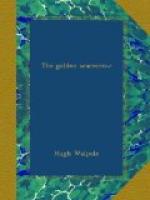“Beautiful woman, though.”
“Oh, lovely!”
Upon a certain afternoon in March about four o’clock, there was quite a gathering of persons in Henry Fitzgeorge’s nursery. There was his mother, with those two great friends of hers, Lady Emily Blanchard and the Hon. Mrs. Vavasour; there was Her Grace’s mother, Mrs. P. Tunster (an enormously stout lady); there was Miss Helen Crasper, who was staying in the house. These people were gathered at the end of the cot, and they looked down upon Henry Fitzgeorge, and he lay upon his back, gazed at them thoughtfully, and clenched and unclenched his fat hands.
Opposite his cot were some very wide windows, and three windows were filled with galleons of cloud—fat, bolster, swelling vessels, white, save where, in their curving sails, they had caught a faint radiance from the hidden sun. In fine procession, against the blue, they passed along. Very faint and muffled there came up from the Square the lingering notes of “Robin Adair.” This is a Wednesday afternoon, and it is the lady with the black straw hat who is singing. The nursery has white walls—it is filled with colour; the fire blazes with a yellow-red gleam that rises and falls across the shining floor.
“I brought him a rattle, Jane, dear,” said Mrs. Tunster, shaking in the air a thing of coral and silver. “He’s got several, of course, but I guess you’ll go a long way before you find anything cuter.”
“It’s too pretty,” said Lady Emily.
“Too lovely,” said the Hon. Mrs. Vavasour.
The Duchess looked down upon her son. “Isn’t he old?” she said. “Thousands of years. You’d think he was laughing at the lot of us.”
Mrs. Tunster shook her head. “Now don’t you go imagining things, Jane, my dear. I used to be just like that, and your father would say, ’Now, Alice.’”
Her Grace raised her head. Her eyes were a little tired. She looked from her son to the clouds, and then back again to her son. She was remembering her own early days, the rich glowing colour of her own American country, the freedom, the space, the honesty.
“I guess you’re tired, dear,” said her mother. “With the party to-night and all. Why don’t you go and rest a bit?”
“His eyes are old! He does despise us all.”
Lady Emily, who believed in personal comfort and as little thinking as possible, put her arm through her friend’s.
“Come along and give us some tea. He’s a dear. Good-bye, you little darling. He is a pet. There, did you see him smiling? You darling. Tea I must have, Jane, dear—at once.”
“You go on. I’m coming. Ring for it. Tell Hunter. I’ll be with you in two minutes, mother.”
Mrs. Tunster left her rattle in the nurse’s hands. Then, with the two others, departed. Outside the nursery door she said in an American whisper:—“Jane isn’t quite right yet. Went about a bit too soon. She’s headstrong. She always has been. Doesn’t do for her to think too much.”




